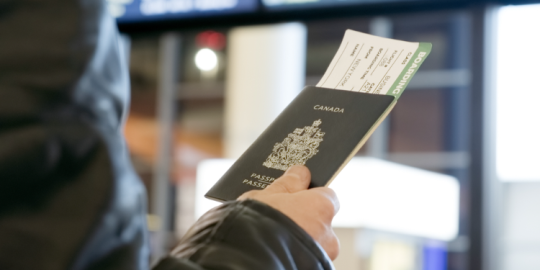The biggest stressors of expat single parents
Moving abroad is a stressful life experience as it is — let alone going through it with one or more children, without the support of a spouse. One of the greatest stress factors for expat single parents is the attitude and engagement of the child's (or childrens') another parent. Are they supportive of the custodial parent's decision to move abroad? Are they willing to travel to spend time with their child in the expat country? Are they willing to contribute towards the payment of international school fees, if such expenses aren't covered by the custodial parent's employer? Besides, expat single parents must still deal with day-to-day hassles of expat life such as change of routines and possibly financial status, communication through a new language, creation of a social network, and arrangement of bureaucratic matters.
What to consider before expatriating as a single parent
If you are planning to work full-time in the expat country, you should make precise arrangements with your employer about work/life balance and more tangible things such as business travels. You should be very realistic about losing your existing support network of extended family and friends, and the urgent need to replace it. Also, childcare and the schooling system in your expat country is likely different from that in your home country. Therefore, you should look into your child's education thoroughly, and contact schools and other expat parents in advance to get the full picture before making a final decision.
Preparing your child for expatriation
In our magazine's “children” news category, we have extensively analysed topics such as advice for expat parents, best expat destinations for children, and tips on how to prepare your child for expatriation. But an expat-to-be can never have too much information regarding the happiness of their children.
Once you are confident that expatriation is the best plan ahead for you and your child (or children), and depending on your children's ages, you should start introducing to them the idea of moving abroad. Their initial response may not be what you are looking for — enthusiasm and support — but gradually you can instil in them a curiosity about the world and the desire to learn a new language, and make new friends. When talking about your expat life, focus on the positives such as quality time together, new activities, and exciting adventures. However, don't try to completely hide the downsides — prepare your children for the changes and even the losses.
Great practice for a smooth expatriation is to involve the children in the process by allowing them to express their opinion, make decisions regarding the new home, school, and hobbies. As time passes by, even if your children appear to cope greatly with their new life, remember to follow up on their progress at school, social life, and confidence levels.
A single expat parent on the ground
As a single parent, you are the primary emotional and practical support for your child or children. Of course, not that you aren't aware of this already, but in stressful times, you may need a reminder of your primary role in your children's lives. It is vital to be conscious of the fact that your children's well-being depends on your health, prosperity, and success. Thus, you shouldn't be feeling guilty when you make time for yourself, feel happy, and have fun. According to experts, children copy their parents' behaviours and feelings, and you want them to copy your best self rather than an insecure, doubtful, and lonely you.
How can companies support expat single parents
Companies may overlook single parents seeking career mobility via an international assignment due to concerns around single parents' work performance, emotional wellness, and financial planning. However, since the numbers of expatriate single parents are increasing, there are ways for employers to not miss out on any of the talents among this group of candidates. An HR officer giving advice on topics such as immigration, visas, legal rights, and benefits is a great start for every company that wishes to incorporate inclusiveness and diversity.
Single parents about to sign an expat contract should be able to negotiate with the company crucial to them matters such as business travel, flexible working hours and working from home possibilities, as well as a compensation package that may include live-in domestic help, caregiver's expenses, children's transportation expenses, etc.
Testimony of an expat single mother
We spoke with Kimberly from the United States, who, for the past two years has been living as an expat single mother in Mexico with her six-year-old son. For Kimberly, this is her first expatriation project, and even though it has been scary at times without having her mother around to help, and being on her own with her little boy, she feels proud for making expatriation happen and not giving up when things get tough.
Kimberly is a freelancer in marketing and cherishes the flexibility that comes with working on her own schedule and from home. She says: “It has really made it easy to cope with being a single mother in a foreign country.” Also, Puerto Vallarta, the resort town on Mexico's Pacific coast where she lives has a big digital nomad community, so she never feels quite “alone.”
We ask Kimberly why she and her son became expats, and she says: “Mainly to immerse ourselves in another language and culture. Also, being able to live more affordably and spend more time with my son in a more relaxed environment was a big factor too. Here, I only work 20-25 hours a week with no commute, whereas in the U.S. I worked 40+ hours a week with two hours commute each day.”
For Kimberly's child, the first few months of expatriation, as he was adjusting to the language, surroundings, and new routine, were rough. “After he started school and began to meet friends, as well as others who spoke English, he was getting more comfortable. Once we began to develop our ‘circle' and find things in the city that he likes to do, he adjusted even more. We speak to family members often via video chat and travel to see them as often as possible, so that makes him feel better about living abroad.” Kimberly explains.
Kimberly isn't very far away from home — this is one of the reasons she chose Mexico — and she had established a “community” in the country prior to arriving with her son, during her travels to different parts of Mexico. For the most part, Kimberly's ex partner was in agreement with her decision to move abroad with his son. “As someone who has travelled immensely himself, he was on board with having our son immersed in a different culture and language. The location made him hesitate initially due to the fears of safety, but after providing him with more information about where we were going, safety rates in our area, and overall opportunities versus staying in the U.S., he was on board,” she says. “I sometimes fear what would happen to my son if something happened to me, but we have become close with other expats, as well as local families, who know how to access us and contact family back home in case of emergency,” she says.
“What advice would you give to single parents who want to become expats?” we ask Kimberly, and she replies: “Never give up on your dream! There will always be people along the way who will make you feel that what you want to do is impossible, selfish, or unsafe. My advice is to get away from those people and get yourself into the circles of parents who are already doing the same. Joining a group of single travelling parents was my very first step to realizing just how many people were doing this and how easy it could be if I committed myself to making it happen. I always tell people, ‘it may not be easy, but it is always possible'.” For more tips on being a single expat parent, finding solutions, and building strength and resilience, visit Kimberly's blog.











